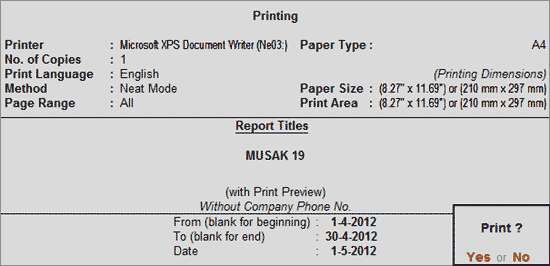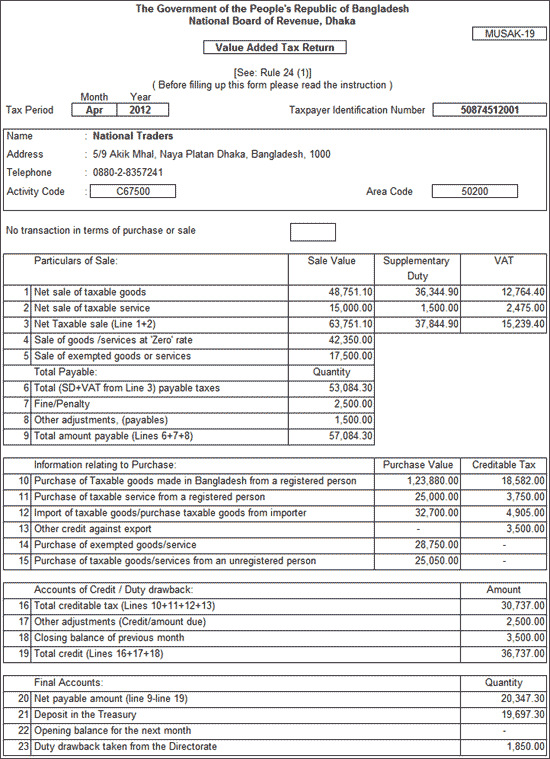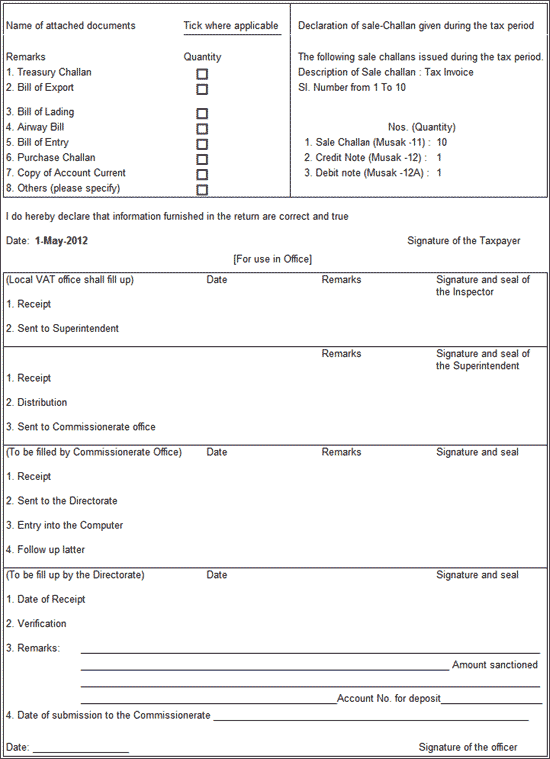
MUSAK 19 is a monthly return form to be filed by regular/ registered dealers. This return form provides details of all the purchases and sales recorded by a registered dealer.
To view the return form – MUSAK-19 for Bangladesh,
Go to Gateway of Tally > Display > Statutory Reports > VAT > VAT Forms > VAT Return Forms > Musak 19
The Print Report screen of MUSAK-19 displays the required information fields relating to the Period for which the report is required (From Date and To Date) and the Date on which the Return is being filed.

The print preview of MUSAK-19 displays as shown.


The explanation of MUSAK-19 is given below:
The dealers registered under the provisions of VAT, have to file Monthly returns within 10 days from the end of the tax period. The starting and ending date of the return period needs to be captured here.
The tax period based on the From and To dates along with the Year as entered in the Print Report screen of MUSAK-19 is captured in this field.
Every supplier of taxable goods or services has to register the business activity with the concerned VAT Officer. In case where the goods sold / services rendered from different places of business, separate registrations can be made if the requisite conditions are satisfied. The Registration number will be given by the Department. This registration number is called as the Business Identification Number which needs to be entered as the Tax Identification number.
The VAT Registration Number, i.e., the VAT TIN as entered in F11: Features > F3: Statutory & Taxation screen is captured in this field.
Name: The name of the company or the business organisation i.e., the Mailing Name as entered in the Company Creation screen is captured in this field.
Address: The Address as entered in the Company Creation screen is captured in this field.
Telephone: The telephone number as entered in Company Creation screen is captured in this field.
Activity Code: The Activity Code as entered in the F11: Features > F3: Statutory & Taxation screen is captured in this field.
Area Code: The Area Code as entered in the F11: Features > F3: Statutory & Taxation screen is captured in this field.
No transaction in terms of purchase or sale: In a particular return period, if no purchase or sales transactions were made then a tick mark has to be put in the box provided.
The value of all taxable goods sold is captured in this field. The value captured is net of returns and adjustments including the increase/decrease in sale price due to price variations.
Sale Value: The Net value of taxable goods sold will be captured in the Sale Value column.
Supplementary Duty: It is charged on the sale value before the levy of VAT. The Supplementary Duty computed on the sale value is captured in the Supplementary Duty column.
VAT: The output VAT levied on the Sale value and Supplementary Duty will be captured in VAT column.
Note: The supplementary duty will be levied on the goods at rates specified in the VAT Act. In the stock item master, the following details must be provided for goods attracting supplementary duty:
• Rate of supplementary duty
• Rate of Duty classification
If supplementary duty is not applicable to the stock item, the duty ledger need not be selected in the voucher. The supplementary duty column will be left blank for such transaction.
The net assessable sale value of taxable goods recorded using Sales @ 15% as the VAT/Tax Class will be captured under the Sale Value column. The supplementary duty charged at applicable rates, with respective VAT/TAX class will be captured under the Supplementary Duty column. The output VAT charged on the sales made by using Output VAT @ 15% as the VAT/Tax Classification will be captured under the VAT column.
The value of all taxable services rendered is captured here. The value captured is net of returns and adjustments including the increase/decrease in sale value due to price variations.
Sale Value: The Net value of taxable services rendered will be captured in the Sale Value column.
Supplementary Duty: It is charged on the sale value before the levy of VAT. The Supplementary Duty computed on the sale value is captured in the Supplementary Duty column.
VAT: The output VAT levied on the Sale value and supplementary duty will be captured in VAT column.
Note: The supplementary duty will be levied on the services at rates specified in the VAT Act. Duty will be charged only on the services attracting supplementary duty. The following details must be provided in the stock item master if the service rendered is treated as an item:
• Rate of supplementary duty
• Rate of Duty classification
If the supplementary duty is not applicable to the service rendered, then the duty ledger need not be selected in the voucher. The Supplementary Duty column will be left blank for such transaction.
The net assessable sale value of taxable services recorded using Sales @ 15% - Services as the VAT/Tax Class will be captured under the Sale Value column. The supplementary duty charged at applicable rates, with respective VAT/TAX class will be captured under the Supplementary Duty column. The output VAT charged on the sales made by using Output VAT @ 15% - Service as the VAT/Tax Classification will be captured under the VAT column.
The net aggregate value of taxable goods sold and services rendered will be captured under the Sale Value column.
Zero rated sales refer to the sale of certain food items in the form of export or deemed export as provided under Section 3(2). Supplementary duty is not charged on such sales made. The value captured is net of returns and adjustments including price variations.
The net value of sales made using Sales – Zero Rated as the VAT/Tax Classification will be captured under the Sale Value column.
The sale of goods and services which are exempted from levy of VAT is termed as Exempt sales. The goods specified under the First Schedule of VAT Act are fully exempted from tax. The value captured will be net of all returns and adjustments including price variations recorded using debit/credit notes.
The net value of sales made using Sales – Exempt as the VAT/Tax Classification will be captured under the Sale Value column.
The aggregate value of Supplementary Duty along with VAT charged on the sale of taxable goods and services will be captured in this field.
The Dealer will be liable to pay the Fine/penalty to the department for any delay made in paying the dues or on contravening any of the VAT provisions. All such adjustment entries made will be captured in this field.
The fine or penalty payable, recorded in journal voucher using Adjustment towards Interest, Penalty or other Dues as the VAT Adjustment will be captured in this field.
The adjustment entries to account for any payments made to the department will be captured in this field. The net increase/decrease in output VAT liability after considering such adjustment entries will be captured here. In case where the adjustment entries lead to:
A decrease in output VAT liability, the value will be captured with a negative sign
An increase in output VAT liability, positive value will be displayed as the payable amount.
The value of entry made through a journal voucher using Other Adjustments as the VAT Adjustments will be captured in this field.
The aggregate value of total output VAT along with supplementary duty, fine/penalty payable and the other adjustments will be captured in this field. In other words, the total of Box 6 + 7 + 8 will be captured here.
The value of all taxable goods purchased from registered dealers is captured in this field. The value captured is net of returns and adjustments including the increase/decrease in purchase price due to price variations.
Purchase Value: The Net value of taxable goods purchased will be captured in the Purchase Value column. The supplementary duty charged on such purchases before the levy of VAT will be captured here as the cost of purchase.
Creditable Tax: The input VAT levied on the purchase cost will be captured here.
Note: The supplementary duty paid can be accounted for in the following two methods:
• Considering the duty paid as cost of purchase and including it in the purchase value
• Selecting a separate ledger created under Purchase Accounts group for appropriating the duty paid in the purchase entry. The value can be appropriated by setting the field Method to allocate when used in Purchase invoice to Appropriate by Value.
The net assessable value of taxable goods purchased using the VAT/Tax Class – Purchases @ 15% will be captured under Purchase Value column. The input VAT charged using Input VAT @ 15% as the VAT/Tax Class will be displayed under the Creditable Tax column. The purchase value captured will be inclusive of additional expenses. The value captured will be net of all adjustments made using debit/credit notes.
The purchase value of all taxable services is captured in this field. The value captured is net of returns and adjustments including the increase/decrease in purchase price due to price variations. Only the services obtained from a registered dealer is displayed here.
Purchase Value: The Net purchase value of taxable services purchased will be captured in the Purchase Value column. The supplementary duty charged on such purchases before the levy of VAT will be captured here as the cost of purchase.
Creditable Tax: The input VAT levied on the purchase cost will be captured here.
Note: The supplementary duty paid can be accounted for in the following two methods:
• Considering the duty paid as cost of purchase and including it in the purchase value
• Selecting a separate ledger created under Purchase Accounts group for appropriating the duty paid in the purchase entry. The value can be appropriated by setting the field Method to allocate when used in Purchase invoice to Appropriate by Value.
The net assessable value of purchases made using the VAT/Tax Class – Purchases @ 15% – Services will be captured under Purchase Value column and the tax charged using Input VAT @ 15% - Services as the VAT/Tax Class will be displayed under the Creditable Tax column. The purchase value captured will be inclusive of additional expenses and supplementary duty paid.
The net assessable value of purchases made using Imports as the VAT/Tax Class will be captured under Purchase Value column.
As stated earlier, the sale of certain food items in the form of export or deemed export as provided under Section 3(2) will be considered as zero rated sales. The tax paid on such goods is refundable in the form of tax credit. All such tax credit will be captured here.
The value of entries made using Export Adjustments as the VAT Adjustment in journal voucher will be captured in this field.
The net assessable value of entries made using Purchases – Exempt as the VAT/Tax Class for both exempt goods and services will be captured in this field. The creditable tax column will be left blank for purchase of exempt goods/services.
The net value of purchases made from unregistered dealers will be captured here. The tax paid on such purchase is considered as cost of purchase as it cannot be availed as tax credit. As a result, the creditable tax column will be left blank.
The net assessable value of entries made using Purchases – From Unregistered Dealer as the VAT/Tax Class will be captured in this field.
The value of input VAT displayed for taxable purchases i.e., Box 10 + 11 + 12 + 13 will be captured in this field.
The adjustment entries to account for the input tax credit will be captured in this field. The net increase/decrease in input tax credit arrived at after considering such adjustment entries will be captured here. The value of tax credit will be captured here if it is either increased on account of any notification or used to discharge any liability under the VAT Act. The adjustment entries resulting in a decrease in tax credit will be captured with a negative sign.
In this field, the value of entry made through a journal voucher using Other Adjustments as the VAT Adjustments will be captured:
With a negative sign if the input VAT ledger is credited
As a positive value if input VAT ledger is debited
This box displays the input tax credit carried forward from previous return period. Also the value entered as opening debit balance for input VAT ledger is captured here. The value as per Box – 22 i.e., Opening balance for the next month will be copied here. The net value of Box – 22 and 23 will be computed and displayed in this field.
The total of creditable tax adjustments made along with the opening balance of previous month will be captured in this field.
The net tax to be paid after deducting the tax credit as per Box – 19 from the payable amount as per Box – 9 will be captured in this field.
The VAT amount paid though a payment voucher using the VAT Payment button will be captured in this field.
The tax credit carried forward to the next tax period will be captured in this field.
The duty drawback obtained can either be in the form of cash or tax credit. The cash drawback will reduce the input tax credit to be carried forward to next tax period. The credit drawback results in an increase in tax credit for the next return period. The Net value of Box – 22 and 23 will be shown in Box – 18 for the next return period.
The value of entry made using Duty drawback taken from Directorate as the VAT Adjustment in a journal voucher will be captured in this field. The value will be captured:
With a negative sign if the input VAT ledger is debited
As a positive value if input VAT ledger is credited
All the fields specified under this section have to be filled in manually.
In the Description of Sale Challan field, Tax Challan will be captured if there are tax challans generated for the return period specified, in report generation screen of MUSAK – 19.
The sales invoice can be generated as tax challan by creating a tax invoice under sales voucher type and setting the option Is Tax Invoice to Yes. Otherwise, the regular sales voucher type can also be used as tax invoice by enabling the aforesaid option in the sales voucher type alteration screen.
The serial number of tax invoices generated for the return period will be captured in this field.
Sale Challan (MUSAK- 11): The number of tax invoices recorded for the return period will be captured in this field
Credit Note (MUSAK - 12): The number of credit notes used will be captured in this field.
Debit Note (MUSAK – 12A): The number of debit notes used will be captured in this field.
The Date in the declaration statement will be captured as specified in the report generation screen of MUSAK – 19.
The fields requiring details of dealer has to be filled manually.